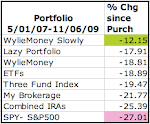Timothy Sykes contacted me and asked if I would be interested in reviewing his soon to be published book, An American Hedge Fund.
I checked out his site, watched videos of some of his TV appearances, shook my head, laughed and said "sure."
After reading the book, my first reaction was: "This guy is nuts!"
Timothy took $12,000 and spent his college years day trading in his dorm room and made millions. That in itself is not nuts- its incredible. And the book explains how he did it in more detail than you might expect.
He started a hedge fund as the title indicates, but the book is less about his fund, and more about him, which is a good thing. He chronicles his journey from a tenacious youngster seeking to maximize profits (I'm glad he never strung my tennis racquet) to a college bound freshman with an obsession for finding market trends and playing them like a professional sportsman, to a young adult trotting the globe and riding high on his successes and also the parts of his personality which he very self consciously has learned can lead him to amazing new opportunities.
He makes the pitch that finance is THE American sport and for him, it certainly was. I say was because it is unclear to me if his market niche, much like some of our more intense physical sports, requires the 'muscles' or 'audacity' of youth. By the end of the book, Timothy seems to be hedging his investing profession with a stake in financial celebrity- a field almost as mysterious to me as Hedge Funds...
Ok- so why am I calling him nuts? I mean it in the most affectionate way possible- This book is highly entertaining as Timothy does a great job of telling his story with the same kind of speed, focus and energy that he must have taken to whatever computer terminal around the globe he found to sign on, and compete in his financial sport.
He shares in great detail, but in plain English, many examples of trends he saw and trades he made both scoring big and fouling out. As the book goes on, he shares more and more about his own ego and lack of discipline getting in the way of consistent crushing returns. His approach toward dealing with overcrowding in his dorm room, 'preparing' for interviews, and the frankness with which he lays bare some of his biggest failures and why he made them paints a picture of a driven, flawed, crazed, man on a mission.
Near the end of the book he sums it all up quite nicely: "Maybe I’m going overboard, but you get the point."
I was left wondering why on earth anyone would want to trust him with their money... but then you remember the $12,000 he started with and the millions he made.
Is investing the American Sport? And is it a game that requires the reckless abandon and singular focus that only a young mind can truly excel at? Will Timothy, like so many professional athletes after great success on the field, move into the media full time? Only time will tell.
But like the stories of some of our more 'lively' athletes, Timothy's tale is a highly entertaining look into the life of a driven competitor. The release date is Oct. 1st, 2007.
Showing posts with label Hedge Funds. Show all posts
Showing posts with label Hedge Funds. Show all posts
7.26.2007
7.24.2007
What is a Hedge Fund?
As media buzz continues to intensify around "Hedge Funds" I have grown more an more curious- just what is a Hedge Fund?
From all the noise, I got the confusing picture that a Hedge Fund has no clear definition, can invest in anything it wants, is only for the very wealthy and charges absurd fees. I also assumed there was a "Hedging" component- meaning that the fund employs counterbalancing strategies.
As far as I can tell, this is pretty much it, with the exception of the "Hedging" part. While some Hedge funds do in fact, 'hedge'... they aren't required to, by definition. Well, maybe they are required to by definition (for all you grammatical literalists), but they are not required to by regulation or as a consistent matter of practice.
Any manager seeking to run an unregulated investment operation can start up a fund and call it a Hedge Fund as long as s/he follows a few guidelines.
1) Allow fewer than 100 investors or only accept clients who earn $200,000 or have investment assets worth more than $5 million. (Different source list different numbers of millions required- more than a million seems to be the case).
2) Don't advertise to the general public.
I'm not making this up folks. Somebody over at wikipedia might be making this up, but I'm not.
So after putting together a group of their closest buddies and pooling their gazillions, what does a Hedge fund manager do? Pretty much whatever s/he wants!
How much does this cost the 'average' investor? Fees appear to generally range from 2% annual fees combined with 20% of profits to 3% plus 30% of profits. Some fees run much higher, some are likely lower but 2/20 to 3/30 appears to be what you will likely run into after you put together your 5 million and start searching for a Hedge Fund to invest in.
I was recently contacted by Timothy Sykes to review his forthcoming book "An American Hedge Fund." I'm reading it now and will review it soon- highly entertaining so far!
I also found Veryan Allen's site. As a big fan of diversification (20 mutual funds in one portfolio?) I like Veryan's stratagey of investing in... I'm not making this up either: 20 Hedge funds. At the very end of this post he says: "Twenty hedge funds managing strategies that have little correlation to each other is probably the MINIMUM number necessary."
Is 20 a magic number for fund picking? I digress.
So anyway- many Mutual Fund Investors might scoff- 2% annual fee and 20% of profits... "That's way too high!"
Of course many mutual funds charge 5% or more up front regardless of whether they earn a cent or lose value in addition to annual expenses which sometimes hit 2% or higherin annual expenses. And I would rather pay 20% of profits on some profits than pay 0% on no profits:

The real issues here are 1) you must have a ton of money to even have access to Hedge Funds thanks to our government protecting us poor folks from ourselves and 2) researching Hedge Funds is not so easy. Finding a single good one, much less finding the 20 required by Mr. Allen, would be quite a chore...
From all the noise, I got the confusing picture that a Hedge Fund has no clear definition, can invest in anything it wants, is only for the very wealthy and charges absurd fees. I also assumed there was a "Hedging" component- meaning that the fund employs counterbalancing strategies.
As far as I can tell, this is pretty much it, with the exception of the "Hedging" part. While some Hedge funds do in fact, 'hedge'... they aren't required to, by definition. Well, maybe they are required to by definition (for all you grammatical literalists), but they are not required to by regulation or as a consistent matter of practice.
Any manager seeking to run an unregulated investment operation can start up a fund and call it a Hedge Fund as long as s/he follows a few guidelines.
1) Allow fewer than 100 investors or only accept clients who earn $200,000 or have investment assets worth more than $5 million. (Different source list different numbers of millions required- more than a million seems to be the case).
2) Don't advertise to the general public.
I'm not making this up folks. Somebody over at wikipedia might be making this up, but I'm not.
So after putting together a group of their closest buddies and pooling their gazillions, what does a Hedge fund manager do? Pretty much whatever s/he wants!
How much does this cost the 'average' investor? Fees appear to generally range from 2% annual fees combined with 20% of profits to 3% plus 30% of profits. Some fees run much higher, some are likely lower but 2/20 to 3/30 appears to be what you will likely run into after you put together your 5 million and start searching for a Hedge Fund to invest in.
I was recently contacted by Timothy Sykes to review his forthcoming book "An American Hedge Fund." I'm reading it now and will review it soon- highly entertaining so far!
I also found Veryan Allen's site. As a big fan of diversification (20 mutual funds in one portfolio?) I like Veryan's stratagey of investing in... I'm not making this up either: 20 Hedge funds. At the very end of this post he says: "Twenty hedge funds managing strategies that have little correlation to each other is probably the MINIMUM number necessary."
Is 20 a magic number for fund picking? I digress.
So anyway- many Mutual Fund Investors might scoff- 2% annual fee and 20% of profits... "That's way too high!"
Of course many mutual funds charge 5% or more up front regardless of whether they earn a cent or lose value in addition to annual expenses which sometimes hit 2% or higherin annual expenses. And I would rather pay 20% of profits on some profits than pay 0% on no profits:

The real issues here are 1) you must have a ton of money to even have access to Hedge Funds thanks to our government protecting us poor folks from ourselves and 2) researching Hedge Funds is not so easy. Finding a single good one, much less finding the 20 required by Mr. Allen, would be quite a chore...
Subscribe to:
Posts (Atom)


